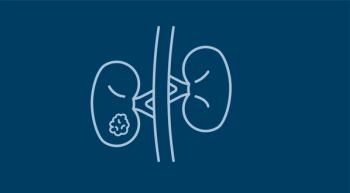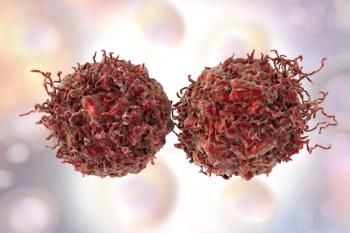
Patients with hepatocellular carcinoma achieved a median overall survival of 15.9 months with tislelizumab and 14.1 months with sorafenib.

Patients with hepatocellular carcinoma achieved a median overall survival of 15.9 months with tislelizumab and 14.1 months with sorafenib.

At a median follow-up of 33.0 months, the median progression-free survival with tumor-infiltrating lymphocyte therapy was 7.2 months vs 3.1 months with ipilimumab.

Results of retrospective analysis of previously treated patients with metastatic renal cell carcinoma who received nivolumab in the second- and third-line showed that health-related quality of life was maintained in the real-world setting

Real-world data from a retrospective study showed that pembrolizumab combined with the anti-VEGF agent bevacizumab plus oral metronomic cyclophosphamide displayed minimal toxicity in a significant number of patients with recurrent epithelial ovarian, fallopian tube, or primary peritoneal cancer.

Patients with relapsed or refractory metastatic colorectal cancer who received dose-optimized regorafenib achieved superior survival outcomes than those who received best supportive care, fruquintinib, standard-dose regorafenib, and trifluridine/tipiracil.

Neoadjuvant immunotherapy starkly outperformed neoadjuvant chemotherapy in eliciting major pathological responses among patients with mismatch repair–deficient colon cancer, according to investigators.

The relapse-free survival rate was 22.3% among patients with resectable stage IIIB to IV M1a melanoma who received neoadjuvant talimogene laherparepvec versus 15.2% among those who received surgery alone.

Patients with triple-negative breast cancer who received pembrolizumab in the neoadjuvant and adjuvant settings demonstrated similar health-related quality-of-life scores compared with patients who received placebo.

A quality-of-life analysis of the pivotal Destiny-Breast04 trial showed that trastuzumab deruxtecan outperformed physician’s choice of treatment in delaying definitive deterioration.

In the phase 1 SURPASS trial, 72% of patients with solid tumors developed any-grade cytokine release syndrome following an infusion of ADP-A2M4CD8. The median time to resolution was 5 days.

Sacituzumab govitecan may represent a promising option for patients with endocrine resistant, hormone receptor–positive/HER2-negative metastatic breast cancer, according to updated findings from the phase 3 TROPiCs-02 study.

Women with ovarian cancer who received 2 years of maintenance therapy with olaparib experienced a 45% reduction in risk of death, according to a 7-year follow-up.

Patients with HER2-positive, metastatic colorectal cancer and higher HER2 expression at baseline experienced improved responses following treatment with trastuzumab deruxtecan.

A 4-year follow-up of patients with treatment-naïve triple-negative breast cancer who received carboplatin plus neoadjuvant paclitaxel, followed by doxorubicin and cyclophosphamide, suggests that the regime induces superior pathological complete response and event-free survival.

Adavosertib decreased the risk of disease progression or death by 65% in patients with TP53-/RAS-mutant metastatic colorectal cancer (mCRC).

A phase 2 trial presented at the 2021 ESMO Annual Congress showed that Balstilimab plus Zalifrelimab induced superior response rates, duration of responses, and overall survival in patients with recurrent/metastatic cervical cancer.

Patients with advanced RCC who received prior VEGF-targeted therapy tend to have longer survival outcomes with cabozantinib than with axitinib.

Rechallenge with maintenance olaparib following response to platinum-based chemotherapy significantly improved PFS in heavily pretreated patients with relapsed ovarian cancer.

Interim findings presented at the 2021 ESMO congress suggest that tisotumab vedotin plus frontline carboplatin and second-/third-Line pembrolizumab may be a suitable treatment option for recurrent/metastatic cervical cancer.

A global study revealed that patients and caregivers alike reported insufficient knowledge surrounding renal cell carcinoma.

Characteristics such as low positive PD-L1 expression and rare high positive staining were identified in both patients with VHL-mutated and VHL wild type clear cell renal cell carcinoma.

Patients with endometrial cancer and high tumor mutational burden experienced superior overall response rates to the agent dostarlimab than patients with low mutational burden.

Patients with nonmetastatic castration-resistant prostate cancer often undergo prolonged treatment periods, making the safety profile of therapies like darolutamide an important factor in optimum treatment selection.

The reversible BET inhibitor CC-90010 was found to have preliminary antitumor activity in patients with heavily pretreated, advanced solid tumors and relapsed/refractory non-Hodgkin lymphoma.

The investigational CAR T-cell product AUTO3 in combination with pembrolizumab was found to have a tolerable safety profile and elicit durable complete responses in patients with relapsed/refractory diffuse large B-cell lymphoma.

As the impact of the coronavirus disease 2019 (COVID-19) pandemic lingers into the later part of 2020, consideration is needed regarding the lasting effects on patients with cancer who may have experienced delayed care or diagnosis.

At the 2019 European Society for Medical Oncology, new study results showed promise for a frontline combination therapy for patients with newly diagnosed, advanced ovarian cancer.

The PARP inhibitor olaparib (Lynparza) significantly improved progression-free survival (PFS) as frontline maintenance therapy in women with BRCA-positive advanced ovarian cancer, according to findings reported at the 2018 European Society of Medical Oncology Congress.

Patients with untreated advanced renal cell carcinoma (RCC) lived significantly longer without disease progression when they received the multikinase inhibitor cabozantinib (Cabometyx) as initial therapy versus sunitinib (Sutent), according to results of an independent review of the randomized CABOSUN trial reported at the 2017 ESMO Congress in Madrid.